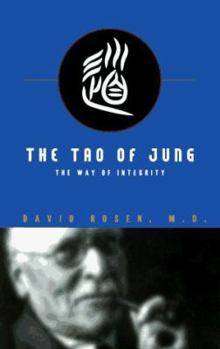The Tao of Jung: The Way of Integrity
Select Format
Select Condition 
Book Overview
This startling new interpretation of Jung's life and psychology is based on the insight that he was essentially a Taoist. Drawing on Jung's own letters, aphorisms, and other writings, David Rosen... This description may be from another edition of this product.
Format:Hardcover
Language:English
ISBN:0670860697
ISBN13:9780670860692
Release Date:September 1996
Publisher:Viking Books
Length:197 Pages
Weight:0.95 lbs.
Dimensions:1.0" x 5.9" x 8.8"
Related Subjects
Behavioral Psychology Behavioral Sciences Biographical Biographies Biographies & History Biography & History Education & Reference Health, Fitness & Dieting Health, Fitness & Dieting Other Eastern Religions & Sacred Texts Philosophy Politics & Social Sciences Psychology Psychology & Counseling Reference Religion Religion & Spirituality Self-Help Spirituality TaoismCustomer Reviews
3 ratings
He who knows, does not speak; he who speaks, does not know - Lao Tzu
Published by Thriftbooks.com User , 18 years ago
Structuring Jung's life into six chronological chapters corresponding to the meaningful episodes of his life, Rosen sets one element of an I Ching trigram to represent an inherent theme found within each these chapters. The Chinese ideogram for 'crisis' is composed of two pictograms; danger and opportunity, each of which is composed of a triad of aspects (or elements). The elegance of the correspondance and the fluidity of the structure, both of the significant chapters of Jung's life, and the manifestation of his philosophy and theory, is evident throughout. Liberally interspersed throughout the text are quotations from Lao Tzu and Chuang Tzu, venerable Tao masters, which enlighten and enliven quotations from Jung's work's and provide simple commentary and elegant correspondance. As Jung said, Tao is "an experience of transformation ... It is not that something is seen, but that one sees differently." Yet despite Rosen's efforts to act as guide and synthesizer of two great conceptual icons, I felt that I could easily have read Jung and Lao Tzu directly and garnered as much insight on my own, and that journey may have been more personally rewarding. If however, you feel that you only want a glimpse into the deeper meanings of Jungian analysis and Taoism, Rosen's work may satisfy you.
Of course Jung was a Taoist; it only makes sense
Published by Thriftbooks.com User , 20 years ago
Rosen attempts to draw parallels between the psychological theories of Jung and the ancient Taoist philosophy/religion. He does this by also telling the story of Jung's personal life and relating incidents in Jung's life to his psychological framework and then linking to concepts from Taoism, usually illustrated with a quote from Lao Tzu. It is of course impossible to discuss Jung without also discussing his relationship with Freud. Freud and Jung agreed that the personal complex casts its shadow on all purely logical thought. However whereas Freud would move in the direction of bringing the complex into the light of consciousness so as to alter its influence on rational thought, Jung places far less hope in rationalism and rather wishes to move toward wholeness where rationalism plays only a role among other forces in the meaning of life. If human existence is a dark mystery, Jung would ask that we light a small candle of insight and consciousness in this vast wasteland. I found the telling of Jung's life story, especially his later years of loss and illness and insight to be very well connected to the points Rosen made with quotes from Lao Tzu. Rosen makes a very strong case that as Jung moved out of the shadow of Freud, his theory of psychology became very Eastern and Taoist. The Self in Jungian psychology is the central column of the psyche and yet it is related to the eternal void. Wholeness of spirit and mind and body in Jung's thought equates with the enlightenment of Zen Buddhism. I found the tremendous resonance between Jung's thought and Taoism to be comforting and expected. Why wouldn't the thoughts of this great psychologist who was willing to incorporate spirituality into his view of wellness also be in tune with the great philosophy of the East, Taoism? It only makes sense that Jung and Lao Tzu frequently sound alike. Rosen does a good job of making this point. I recommend the book for anyone interested in study of Jung or Taoism.
TERRIFIC, PERSONAL, HONEST & REAL
Published by Thriftbooks.com User , 26 years ago
Imagine a shrink who can see and hear without claptrap and jargon. Imagine a sweet recollection of how Jung affected a life (the writers). The book is real and terrific and a clear way of seeing the soul of Jung and the soul of a Jungian who doesn't talk in jargon. It is almost like finding a lawyer who doesn't think he is a genius because he graduated law school and sees the world as case law; a lawyer who also speaks to be heard and understood as opposed to separate himself in some vaguely superior way in order to establish a basis for time billing from jargon alone.The book is really a wonder of subtle sensibility and integration at a highly personal level.






